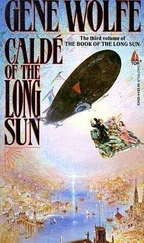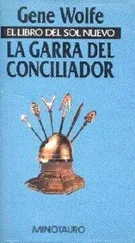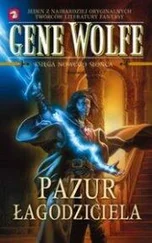Gene Wolfe - On Blue's waters
Здесь есть возможность читать онлайн «Gene Wolfe - On Blue's waters» весь текст электронной книги совершенно бесплатно (целиком полную версию без сокращений). В некоторых случаях можно слушать аудио, скачать через торрент в формате fb2 и присутствует краткое содержание. Год выпуска: 2000, ISBN: 2000, Издательство: Macmillan, Жанр: Фантастика и фэнтези, на английском языке. Описание произведения, (предисловие) а так же отзывы посетителей доступны на портале библиотеки ЛибКат.
- Название:On Blue's waters
- Автор:
- Издательство:Macmillan
- Жанр:
- Год:2000
- ISBN:9780312872571
- Рейтинг книги:4 / 5. Голосов: 1
-
Избранное:Добавить в избранное
- Отзывы:
-
Ваша оценка:
- 80
- 1
- 2
- 3
- 4
- 5
On Blue's waters: краткое содержание, описание и аннотация
Предлагаем к чтению аннотацию, описание, краткое содержание или предисловие (зависит от того, что написал сам автор книги «On Blue's waters»). Если вы не нашли необходимую информацию о книге — напишите в комментариях, мы постараемся отыскать её.
On Blue's waters — читать онлайн бесплатно полную книгу (весь текст) целиком
Ниже представлен текст книги, разбитый по страницам. Система сохранения места последней прочитанной страницы, позволяет с удобством читать онлайн бесплатно книгу «On Blue's waters», без необходимости каждый раз заново искать на чём Вы остановились. Поставьте закладку, и сможете в любой момент перейти на страницу, на которой закончили чтение.
Интервал:
Закладка:
Seawrack nodded meekly.
“Do not return. For my own sake I would have you stay. For yours I tell you go.”
“I understand, Mother.”
“This man may hurt you.”
I swore that I would do nothing of the sort.
“If he does, you must bear it as women do. If you hurt him, it is the same.” Then the goddess spoke to me. “Do not permit her to eat uncooked flesh, or to catch fish with her hands. Do not allow her to do anything that your own women do not do.”
I promised I would not.
“Protect her from your beast, as you would one of your own women.”
Her parting words were for Seawrack. “I have ceased to be for you. You are alone with him.”
More swiftly than she had risen, she slid beneath the swell. For a moment I glimpsed through the water-or thought that I did-something huge and dark on which she stood.
Sometime after that, when I had recovered myself, Seawrack asked, “Are you going to hurt me?”
“No,” I said. “I will never hurt you.” I lied, and meant it with all my heart. As I spoke, Babbie grunted loudly from his place in the bow; I feel sure that he was pledging himself just as I had, but it frightened her.
I squatted and rolled her strip of raw fish in the oily cornmeal, put it in the pan, and held the pan over the fire. “Babbie won’t hurt you,” I said. “I’ll make one of these for him next, and then cook another one for me, so that we can all eat together.”
He was already off the foredeck and edging nearer to the fire. “Babbie, you are not to hurt…” I tried to pronounce the name the goddess had used, and the young woman who bore it laughed nervously.
“I can’t say that,” I told her. “Is it all right if I call you Seawrack?”
She nodded.
“This is Babbie. He’s a very brave little hus, and he’ll protect you anytime that you need it. So will I. My name is Horn.” She nodded again.
Thinking of the silver jewelry Marrow had given me to trade with, I said, “You must like rings and necklaces. I have some, though they are not as fine as yours. Would you like to see them? You may have any that you like.” “No,” she told me. “You do.”
“I like them?” I flipped her fillet, catching it in the pan. She laughed again. “I know you do. Mother says so, and she gave me these so you would like me.” She took off her necklace and offered it to me, but I assured her that I liked her more than her jewelry. In the end we put her gold in the box with my silver, from which I gave her an ornamented comb. I contrived a sort of skirt for her as well, wrapping her in a scrap of old sailcloth which I fastened with a silver pin.
That evening, while we were watching the slender column of dark smoke rise and admiring the fashion in which the sparks flung up by our green firewood danced upon the air, she put Babbie’s head in her lap, something I would never have thought of doing. As her left hand stroked it, I noticed the dried blood among the folds of skin on the stump that had been her right arm, and understood why she had been so afraid of Babbie, and whose blood had stained the deck at the bow. “It was not you who sang for us,” I told her. “It was the goddess. I thought at first that it must have been you, but I’ve heard her speak now, and that was her voice.”
“To make you like me.”
“I understand. Like the gold. She wanted to find you a new home. Mothers are like that.”
Seawrack shook her head, but I felt certain I had been right in principle.
So it was, I believe, in the case that the ambassadors from Skany described to me. The woman who had perished when their lander left the Whorl had been the bride’s natural mother. The poor woman who called herself the bride’s mother now had adopted her, or at least considered herself to have adopted her, and when she was old enough had found her a new home in the house of a man of wealth and position. Each was speaking what she believed to be the truth, and to settle the affair between them it would be necessary to determine the degree to which a real adoption had taken place. Had there been any attempt to record the adoption with someone in authority? Did the poor woman’s natural children (if she had any) consider the bride their sister? Did the poor woman habitually speak of her as her daughter? And so on.
Seawrack’s situation differed in that she considered the sea goddess her mother-much more so, I would guess, than the goddess considered Seawrack her daughter. Accepting the gold, I had accepted Seawrack; it was her dowry. The goddess’s song, however, had not been payment but a species of charm (I am using the word very loosely) to soften our hearts and insure Seawrack a more friendly reception next time.
Did it work? I believe that I would have welcomed Seawrack without it, but would I? I was conscious that I was, at least in some sense, betraying Nettle; but what was I to do? Leave a maimed and friendless young woman alone in the middle of the sea?
She was frightened that night, and in pain from her amputation. I held her; and we slept, for the few hours that either of us slept, with my arms around her and her back to my chest.
Too often I have merely glanced at the last sheet before I began to write, and taken up my narration, as I believed, from the point at which I left it the day before. Or as has sometimes happened, from the week before. Today I have read everything I have written already about Seawrack, growing sicker and sicker as I came to appreciate my own failure. I am going to start over.
Seawrack, as I have said, was waiting for us in the sloop. When I was a boy in Viron and I heard from her own lips how Chenille had wandered naked through the tunnels, I had longed to see her like that. She was, as I tried to make clear in the book Nettle wrote with me, a large and muscular woman, with big shoulders, a sharply denned waist, amply rounded hips, and large breasts. At that time, I had never seen a naked woman, not even Nettle, although I had caressed Nettle’s breasts.
When I saw Seawrack in the sloop, it was as if I were a boy again, shaking in the grip of wonder. Perhaps it was the spell of the sea goddess’s song, although I do not think so. If there was magic in it, the magic was in Seawrack’s body, so tenderly and so sleekly curved, in her face, and most of all in her glance. She was a woman, but did not yet know that she was a woman. She had left childhood behind, but had taken all that is most attractive in children with her. Seeing her as the boy I had been would have, I would have given anything in the whorl to have her love. And I felt certain that I would never have it.
Soon I was to gaze upon the sea goddess of the Vanished People. Perhaps she was Scylla in another form, as Silk once confided to me that Kypris was becoming another form of the Outsider, whose many forms had spoken to Silk that unforgettable noon on the ball court as a crowd speaks, while one whispered to his right ear and another to his left.
Here I am reminded irresistibly of Quadrifons, Olivine’s god, he of the four faces. Is it even possible that he is not a form of the Outsider as well? Considering Olivine, and the life she lived as a species of ghost in the Caldé’s Palace, I do not think so. And if Quadrifons (whose sign of crossroads may well have become Pas’s sign of addition) was in the final reckoning none other than the Outsider-which now seems certain to me-might not the Mother be Scylla as well?
Perhaps.
But I do not really believe it. In a town one cobbler, as the saying goes, and in another town another; but they are not the same cobbler, although they own similar tools, do similar work, and may even be similar in appearance.
This is what I think, not what I know:
Having the sea, as we in Old Viron did not, the Neighbors had also a goddess of the sea. She may have been their water goddess as well, as Scylla is at home; I cannot say.
Читать дальшеИнтервал:
Закладка:
Похожие книги на «On Blue's waters»
Представляем Вашему вниманию похожие книги на «On Blue's waters» списком для выбора. Мы отобрали схожую по названию и смыслу литературу в надежде предоставить читателям больше вариантов отыскать новые, интересные, ещё непрочитанные произведения.
Обсуждение, отзывы о книге «On Blue's waters» и просто собственные мнения читателей. Оставьте ваши комментарии, напишите, что Вы думаете о произведении, его смысле или главных героях. Укажите что конкретно понравилось, а что нет, и почему Вы так считаете.











